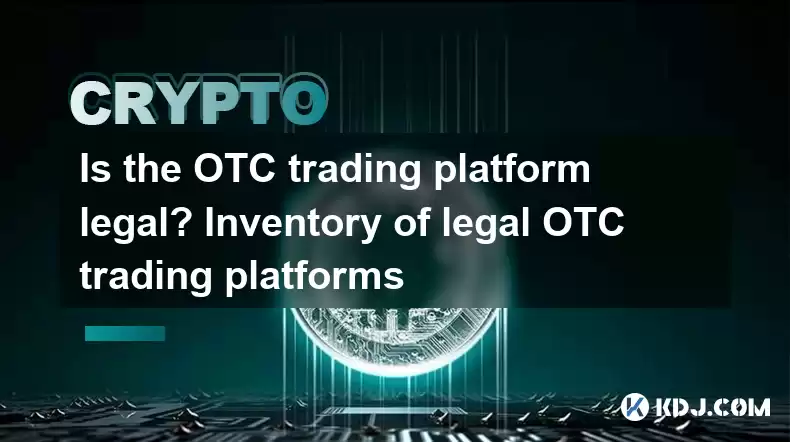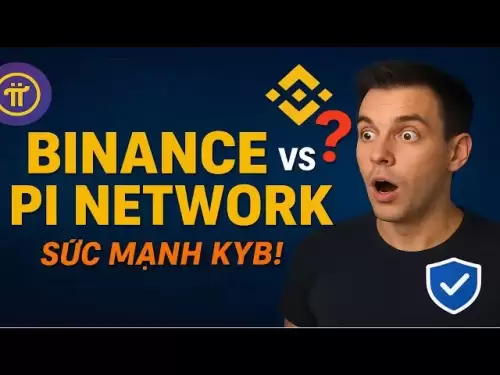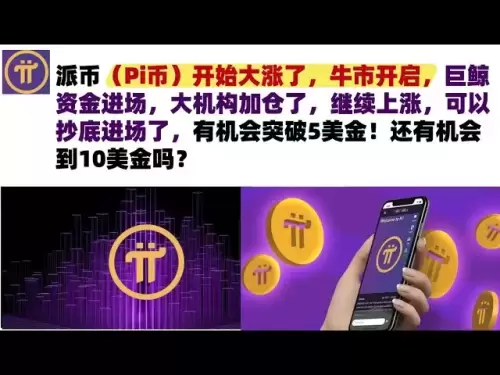-
 Bitcoin
Bitcoin $116400
-0.36% -
 Ethereum
Ethereum $4033
3.40% -
 XRP
XRP $3.302
-1.26% -
 Tether USDt
Tether USDt $1.000
-0.02% -
 BNB
BNB $796.1
1.67% -
 Solana
Solana $177.8
1.89% -
 USDC
USDC $0.9999
0.00% -
 Dogecoin
Dogecoin $0.2314
4.09% -
 TRON
TRON $0.3381
0.14% -
 Cardano
Cardano $0.7989
1.22% -
 Stellar
Stellar $0.4496
-1.84% -
 Chainlink
Chainlink $20.42
9.42% -
 Hyperliquid
Hyperliquid $41.17
0.88% -
 Sui
Sui $3.914
3.77% -
 Bitcoin Cash
Bitcoin Cash $584.7
1.52% -
 Hedera
Hedera $0.2632
-0.54% -
 Avalanche
Avalanche $24.09
3.40% -
 Ethena USDe
Ethena USDe $1.001
-0.02% -
 Litecoin
Litecoin $123.2
1.33% -
 Toncoin
Toncoin $3.318
-0.04% -
 UNUS SED LEO
UNUS SED LEO $8.984
-0.05% -
 Shiba Inu
Shiba Inu $0.00001323
2.85% -
 Uniswap
Uniswap $10.90
4.41% -
 Polkadot
Polkadot $3.999
3.34% -
 Dai
Dai $1.000
0.01% -
 Cronos
Cronos $0.1630
9.64% -
 Bitget Token
Bitget Token $4.484
0.82% -
 Monero
Monero $272.4
2.44% -
 Pepe
Pepe $0.00001173
6.03% -
 Aave
Aave $290.8
2.88%
Is the OTC trading platform legal? Inventory of legal OTC trading platforms
OTC trading platforms, while offering benefits such as confidentiality and large execution volume, vary in legality depending on jurisdiction and necessitate compliance with local laws and regulatory frameworks.
Feb 06, 2025 at 07:30 pm

Key Points:
- Definition and Legality of OTC Trading Platforms:
- Registry of Reputable OTC Trading Platforms:
- Compliance and Regulatory Measures:
- Risks and Considerations:
- Benefits and Advantages:
- FAQs on OTC Trading Platforms:
Is the OTC Trading Platform Legal?
Over-the-counter (OTC) trading platforms operate outside traditional exchanges and facilitate direct transactions between buyers and sellers. Their legality varies depending on the jurisdiction and regulatory framework.
Generally:
- Most jurisdictions recognize OTC trading as a legitimate practice.
- OTC platforms must comply with local laws and regulations.
- Compliance measures include know-your-customer (KYC) verification and anti-money laundering (AML) protocols.
Registry of Reputable OTC Trading Platforms
Numerous reputable OTC trading platforms operate globally. Each platform has unique features and areas of specialization.
- Genesis Trading: One of the largest OTC desks globally, offering services in various cryptocurrencies.
- GSR: A leading market maker and OTC liquidity provider with a strong focus on institutional clients.
- BTC Markets: Australia's largest digital currency exchange, offering OTC services for institutional and high-net-worth investors.
- Bittrex: A popular cryptocurrency exchange that offers a dedicated OTC desk for large-volume trades.
- Kraken: A reputable exchange with a robust OTC trading platform for institutional clients.
- Binance: The world's largest cryptocurrency exchange, offering OTC services for large transactions and institutional investments.
- Coinbase: A popular exchange with an OTC desk specifically tailored for institutional investors.
- FTX: A major exchange that has recently filed for bankruptcy protection.
Compliance and Regulatory Measures
OTC trading platforms are subject to compliance and regulatory measures to prevent illicit activities and protect investor interests.
- KYC and AML: Platforms typically require users to undergo KYC and AML verification to combat money laundering and fraud.
- Registration and Licensing: In some jurisdictions, OTC platforms must register and obtain licenses from regulatory bodies.
- Audits and Inspections: Platforms may be subject to regular audits and inspections to ensure compliance.
Risks and Considerations
OTC trading platforms offer advantages but also carry certain risks.
- Counterparty Risk: OTC trades are bilateral agreements with specific counterparties. Counterparty default can lead to significant losses.
- Price Manipulation: OTC platforms may have less liquidity than exchanges, increasing the potential for price manipulation and slippage.
- Market Risk: Cryptocurrencies are highly volatile, and OTC trades expose investors to market risks.
- Legal and Regulatory Uncertainty: Regulations for OTC trading platforms vary across jurisdictions, and changes in regulatory frameworks can impact operations.
Benefits and Advantages
Despite the risks, OTC trading platforms offer several benefits and advantages.
- Confidentiality: OTC trades are often executed privately, preserving confidentiality for large transactions.
- Tailored Transactions: OTC platforms can customize trades to meet specific requirements of buyers and sellers.
- Larger Execution Volume: OTC desks can facilitate large-volume transactions, suitable for institutional investors and whales.
- Flexibility and Personalization: OTC platforms offer flexible trading conditions and personalized services for their clients.
- Access to Institutional Investors: OTC desks provide a channel for retail investors to access institutional-grade liquidity.
FAQs on OTC Trading Platforms
Q: What are the main differences between OTC and exchange trading?
A: OTC trades are bilateral agreements with specific counterparties, while exchange trades happen on a centralized platform with multiple buyers and sellers.
Q: Is it safe to use OTC trading platforms?
A: The safety of OTC trading platforms depends on their compliance with KYC, AML, and other regulatory measures.
Q: What are the benefits of using OTC trading platforms?
A: OTC platforms offer confidentiality, tailored transactions, large execution volume, flexibility, and access to institutional investors.
Q: What are the risks involved in OTC trading?
A: OTC trading carries counterparty risk, price manipulation risk, market risk, legal and regulatory uncertainty, and potential liquidity issues.
Disclaimer:info@kdj.com
The information provided is not trading advice. kdj.com does not assume any responsibility for any investments made based on the information provided in this article. Cryptocurrencies are highly volatile and it is highly recommended that you invest with caution after thorough research!
If you believe that the content used on this website infringes your copyright, please contact us immediately (info@kdj.com) and we will delete it promptly.
- Shiba Inu (SHIB) in the Crypto Landscape: Community, Trends, and Future Outlook
- 2025-08-09 20:30:12
- Solana, Unilabs, and Social Trends: Decoding the Crypto Buzz
- 2025-08-09 21:10:12
- Dogecoin, Meme Coins, and Layer Brett: Chasing the Next 100x
- 2025-08-09 20:50:12
- Crypto Presales in 2025: Are They Set to Outperform Launches?
- 2025-08-09 20:55:15
- Solana, Cardano, and Shiba Inu: Navigating the Crypto Landscape Beyond the Hype
- 2025-08-09 21:15:27
- Lasers in Modern Warfare: Iron Beam and the Future of Defense
- 2025-08-09 20:30:12
Related knowledge

What is Ethereum’s Slashing mechanism and how to punish malicious behavior?
Feb 20,2025 at 03:08am
Key PointsOverview of slashingDifferent types of slashing in EthereumIncentives and consequences of slashingIdentifying and reporting slashed validato...

What is the verifier node of Ethereum and how to become a verifier?
Feb 19,2025 at 06:00pm
The Verifier Node of Ethereum: A Comprehensive GuideKey Points:What is a Verifier Node?How to Become a Verifier NodeResponsibilities and Rewards of a ...

What is Ethereum’s staking, and how to participate and earn money?
Feb 19,2025 at 04:37pm
Key Points:Understanding Ethereum's Staking MechanismSteps to Participate in StakingBenefits and Rewards of StakingSecurity and Risk ConsiderationsTec...

What is Ethereum’s DAO (Decentralized Autonomous Organization) and how does it work?
Feb 20,2025 at 03:12am
Key PointsDefinition and Structure of a DAOGovernance and Decision-Making in DAOsBenefits and Use Cases of DAOsChallenges and Limitations of DAOsWhat ...

What is Ethereum's multi-signature wallet and how to improve security?
Feb 20,2025 at 02:18pm
Key Points:Understanding the Concept of a Multi-Signature WalletBenefits and Drawbacks of Multisig WalletsRequirements for Setting Up a Multisig Walle...

What is Ethereum's oracle and how to provide data for smart contracts?
Feb 21,2025 at 01:30am
Key Points:Understanding the concept of oracles in EthereumExploring different types of oraclesDetailed guide on how to provide data for smart contrac...

What is Ethereum’s Slashing mechanism and how to punish malicious behavior?
Feb 20,2025 at 03:08am
Key PointsOverview of slashingDifferent types of slashing in EthereumIncentives and consequences of slashingIdentifying and reporting slashed validato...

What is the verifier node of Ethereum and how to become a verifier?
Feb 19,2025 at 06:00pm
The Verifier Node of Ethereum: A Comprehensive GuideKey Points:What is a Verifier Node?How to Become a Verifier NodeResponsibilities and Rewards of a ...

What is Ethereum’s staking, and how to participate and earn money?
Feb 19,2025 at 04:37pm
Key Points:Understanding Ethereum's Staking MechanismSteps to Participate in StakingBenefits and Rewards of StakingSecurity and Risk ConsiderationsTec...

What is Ethereum’s DAO (Decentralized Autonomous Organization) and how does it work?
Feb 20,2025 at 03:12am
Key PointsDefinition and Structure of a DAOGovernance and Decision-Making in DAOsBenefits and Use Cases of DAOsChallenges and Limitations of DAOsWhat ...

What is Ethereum's multi-signature wallet and how to improve security?
Feb 20,2025 at 02:18pm
Key Points:Understanding the Concept of a Multi-Signature WalletBenefits and Drawbacks of Multisig WalletsRequirements for Setting Up a Multisig Walle...

What is Ethereum's oracle and how to provide data for smart contracts?
Feb 21,2025 at 01:30am
Key Points:Understanding the concept of oracles in EthereumExploring different types of oraclesDetailed guide on how to provide data for smart contrac...
See all articles

























































































